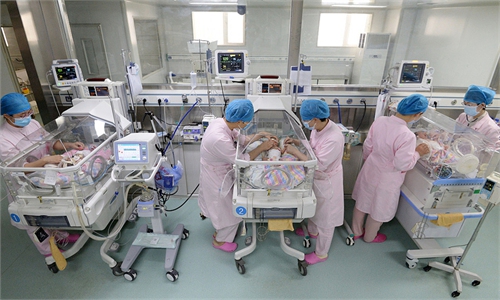Childcare, students' study pressure become factors affecting fertility rate in China: report

Children play in an adventure playground at a tourist attraction in Nanning, South China's Guangxi Zhuang Autonomous Region, May 1, 2021. Photo: Xinhua
The rate of childcare enrollment and students' study pressure have become factors affecting the fertility rate in China, as research indicated that the longer a student spends on study, the lower the fertility level is.
Families with students in compulsory education are facing the highest pressure in terms of money and time. The average cost of raising a child between the age of 6 and 14 in Chinese families exceeds 210,000 yuan ($31,021), accounting for 44.65 percent of the total cost of raising a child up to the age of 18, according to a report published on Monday by the YuWa Population Research think tank. The think tank was established by a group of demographers and economists, including Peking University economics professor Liang Jianzhang.
The structural imbalance of the preschool service system is a major dilemma the country is facing in its preschool education, said the report. There is a supply gap of childcare services for children aged 0-3 years old, but at the same time, with the decrease of the birth population, kindergarten services for children aged 3-5 years old may be facing "oversupply," Liang said at an online meeting to elaborate on the newly released report on Monday.
Statistics show that for one third of the 42 million children under the age of 3, there is strong demand for childcare services, but the actual situation is that only about 5.5 percent of them have got the services, which is significantly lower than the average among the Organization for Economic Cooperation and Development (OECD) members of 35 percent, the report noted.
In 2021, there were 294,800 kindergartens nationwide, with more than 48 million children enrolled, said the report.
The report also listed insufficient financial investment as one of the reasons for the low rate of childcare services.
China has made efforts in optimizing birth policy to promote long-term and balanced population development. Some local authorities have also released local policies. For instance, in Northeast China's Heilongjiang Province, couples with household registration in Harbin who have two or more children can receive a monthly childcare subsidy for each child until the child is 3 years old.
The number of newborns in 2021 stood at 10.62 million, according to the National Bureau of Statistics. The number of newborns in the Chinese mainland has been dropping for five consecutive years since 2017, after the figure reached 18.83 million in 2016, according to the Xinhua News Agency.
Global Times

